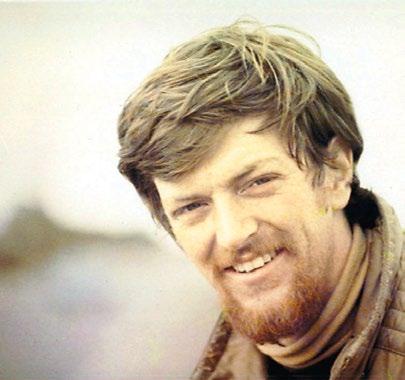A conversation with Don Rearden, author of the Alaska pandemic novel The Raven’s Gift
The Future Our Past Creates By Joe Yelverton
“A
fter several months he ventured outside the school for the first time. He’d spent days watching and listening for any sounds. Everyone in the village was either hiding out, had fled, or were, like so many others, dead.” This passage comes early in The Raven’s Gift, a novel written by Alaska author Don Rearden in 2013, about southwestern Alaska in the grip of a deadly pandemic. Told through the eyes of John Morgan, a school teacher and newcomer to Alaska, the story is as much about a rampant virus as it is an essay on Alaska’s troubled history, its endangered culture, and a statement about greater America and its seeming indifference to the perils of life without a rich culture or deeply rooted traditions. “He didn’t go far,” Rearden tells us. “Just out to get his bearings, get some air, and see if things were as bad as they looked from his peephole above the village.” “They were worse,” Morgan discovers. The naive educator suddenly comes to terms with the realization that he’s completely cut off from the outside world, especially where he came from in the Lower 48. Even more dire, he realizes he’s been betrayed by his own sense of independence, learned in a world full of amenities and abundant food. Our protagonist feels the kind of gravity that few people ever experience: isolation in the middle of a vast landscape, dominated by tundra that’s not easily traveled, far from the conveniences and safety of urban living. John Morgan arrives as a foreigner in a place where the burden of subsistence is constant, even under the best of circumstances, but after the virus begins sweeping through villages we see him experience the worst circumstances imaginable. Most everyone around him is either dead or dying. “Before the sickness,” writes Rearden, “the weathered plywood houses stood without paint.” “Beside the houses rested the rusted carcasses of boat motors and old red three wheelers and four wheelers
24
A L A S K A H U M A N I T I E S F O R U M S U M M E R 2020
with flat tires, white five gallon buckets, shredded blue tarps that covered sheds and flapped in the wind. Even then everything possessed a worn appearance, as if the hand of god brushed and burnished each item in just the right spots so that outsiders would know the irrelevance of time in such an ancient land.” Rearden knows this ancient land well, having spent the first twenty plus years of his life out on the tundra, with four of those years teaching at the same high school in Bethel where he graduated. Now a professor at University of Alaska Anchorage, and Chair of the Department of Writing, Rearden is a student of Alaska history and cultures, having immersed himself in the study of early diseases that plagued Native Alaskans, resulting in the decimation of many communities. With COVID-19 at the forefront, The Raven’s Gift is all the more relevant, as much about human vulnerability as it is a cautionary tale of what can happen, especially to people who live in isolated places like Alaska, where a single outsider can trigger a chain reaction, leading to the infection of hundreds if not thousands of people, many of whom have limited access to advanced health care. On March 18 of this year the Anchorage Daily News featured an opinion piece by Alaska’s Chief Medical Officer, Dr. Anne Zink; in “The Time to Act is Now,” she wrote: As reports of an illness began spreading across the United States, reactions were mixed. One city took it seriously, closing the schools, isolating the ill, advising citizens to “socially distance” themselves and wash their hands frequently. Another city, against the advice of health officials, held a large parade. Within days, many in the city where the parade had been held became ill. Within six months, 16,000 people in that city—Philadelphia—had died. In St. Louis, however, where strict health measures were enacted within days of the first










